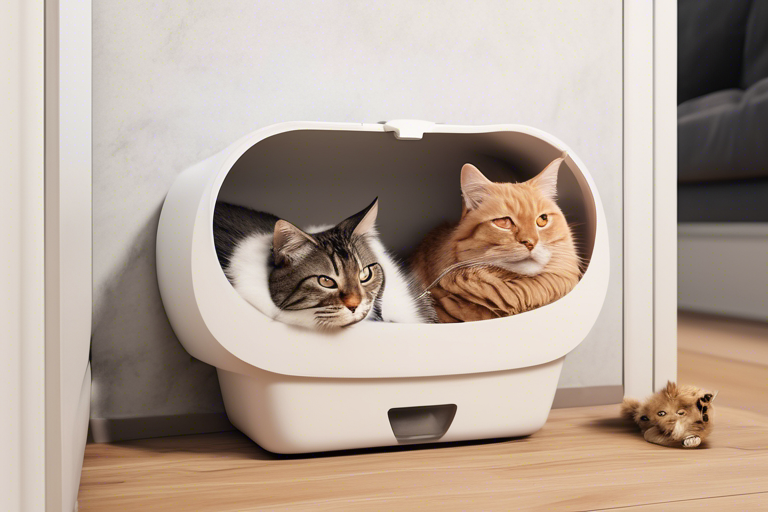The Truth Behind Cats Sleeping Next to the Litter Box: A Comprehensive Guide
Introduction
Cats are known for their quirky behavior and unique sleeping habits. While it may seem strange to us, some cats have a habit of sleeping next to their litter box. This behavior can raise concerns for cat owners, as it may not be the most hygienic or comfortable place for a cat to rest. In this comprehensive guide, we will delve into the reasons why cats sleep next to their litter boxes, the potential problems it can cause, and what you can do to help your feline friend find a more suitable sleeping spot.
Why Do Cats Sleep Next To Litter Boxes?
There are several reasons why cats may choose to sleep next to their litter boxes Understanding these reasons can help shed light on this peculiar behavior:
1. Feeling Secure
Some cats find comfort and security in confined spaces, and a litter box can provide just that. If your cat is sleeping next to their litter box, it could be because they feel protected in that space.
2. Marking Territory
Cats are known for their territorial behavior, and sleeping next to their litter box is another way for them to claim their space. By rubbing their scent all over the litter box and then snuggling up next to it, they are sending a message to other cats that this area belongs to them.
3. Heat Retention
Certain types of litter boxes are made of materials that retain heat, creating a cozy spot for cats to catch some z’s. If your cat is sleeping next to their litter box, it could be because it provides warmth and comfort.
Is It Normal for Cats to Sleep Near Their Litter Box?
While it may not be uncommon for cats to sleep near their litter boxes, it’s important to understand that it’s not necessarily a desirable behavior for cat owners. The litter box is where cats go to relieve themselves, and having them sleep next to it can lead to various issues.
Hygiene Concerns
One of the main reasons why sleeping next to the litter box is not ideal is the lack of hygiene. The litter box is where cats eliminate waste, and having them sleep in such close proximity to their own waste can be unsanitary and potentially lead to health problems.
Tracking Litter and Odor
When cats sleep next to their litter box, they are more likely to track litter and waste out of the box and into the surrounding area. This can create an unpleasant odor in your home that is difficult to eliminate.
Potential Problems and Health Risks
Sleeping next to the litter box can pose various problems and health risks for cats:
Bacterial Infections
Sleeping in the area where they eliminate can increase the risk of bacterial infections for cats. Bacteria from their waste can come into contact with their eyes, ears, and other parts of their bodies, leading to infections.
Skin Irritation and Infections
If litter gets caught in your cat’s fur while they’re sleeping, it can cause skin irritation and potentially lead to infections. Regular grooming may not be enough to remove all the litter particles, putting your cat at risk.
Digestive Issues
If your cat accidentally ingests litter particles while sleeping next to the litter box, it can cause digestive issues and potentially lead to blockages in their digestive tract.
What You Can Do if Your Cat Won’t Stop Sleeping Next to Their Litter Box

If your cat insists on sleeping next to their litter box, there are several steps you can take to encourage them to find a more suitable sleeping spot:
1. Provide Cozy Bedding
Ensure that your cat has a comfortable and cozy bed or mat to sleep on, separate from their litter box. Adding a blanket or cushion can make it even more inviting for them.
2. Offer Alternative Sleeping Spots
Experiment with different types of bedding and sleeping spots to see what your cat prefers. Some cats may enjoy beds with high sides or soft cushions, while others may prefer elevated perches or cat trees.
3. Create a Designated Cat Bed
If your cat isn’t interested in the bedding you provide, consider creating a designated cat bed. This can be as simple as a cardboard box with a soft blanket inside or a more elaborate cat tree or shelf that provides a cozy sleeping spot.
4. Keep the Litter Box Clean
Ensure that you clean the litter box regularly to maintain good hygiene. A dirty litter box may discourage your cat from using it and increase the likelihood of them sleeping next to it.
5. Seek Veterinary Help if Needed
If your cat continues to sleep next to their litter box despite your efforts, it may be a good idea to consult with a veterinarian. They can help identify any underlying medical or behavioral issues that may be contributing to this behavior and provide appropriate treatment.
Additional Tips and Considerations
In addition to the steps mentioned above, here are a few more tips to help address the issue of cats sleeping next to their litter boxes:
- Move the Litter Box: If your cat is particularly attached to their current sleeping spot, consider moving the litter box to a new location. Make sure the new spot is easily accessible and that your cat feels comfortable using it.
- Use a Covered Litter Box: Some cats may prefer the privacy and security provided by a covered litter box. Consider switching to a covered box to see if it encourages your cat to use the box without feeling the need to sleep next to it.
- Litter Box Training: If your cat’s behavior is a result of a lack of litter box training, you may need to retrain them. Gradually move the litter box to a new location and reward your cat for using it in the correct spot.
- Provide Stimulation: Cats may resort to sleeping next to their litter box out of boredom or a lack of stimulation. Ensure that your cat has plenty of toys and opportunities for interactive play to keep them engaged and active.
- Consult with a Behaviorist: If all else fails, consider consulting with a professional behaviorist who specializes in cat behavior. They can provide personalized advice and guidance to help address the underlying issues causing your cat to sleep next to their litter box.
Remember, every cat is unique, and what works for one may not work for another. Be patient and persistent in trying different solutions until you find what works best for your cat. With time and effort, you can help encourage your cat to find a more suitable sleeping spot and eliminate the potential problems associated with sleeping next to the litter box.
Conclusion
While it may be puzzling to see your cat sleeping next to their litter box, there are reasons behind this behavior. By understanding why cats do this and taking appropriate steps to address it, you can ensure that your feline companion has a comfortable and hygienic sleeping environment. Whether it’s providing cozy bedding, offering alternative sleeping spots, or seeking veterinary help if needed, there are various strategies you can implement to encourage your cat to find a more suitable place to snooze. Remember to prioritize your cat’s well-being and create a safe and comfortable space for them to rest.






